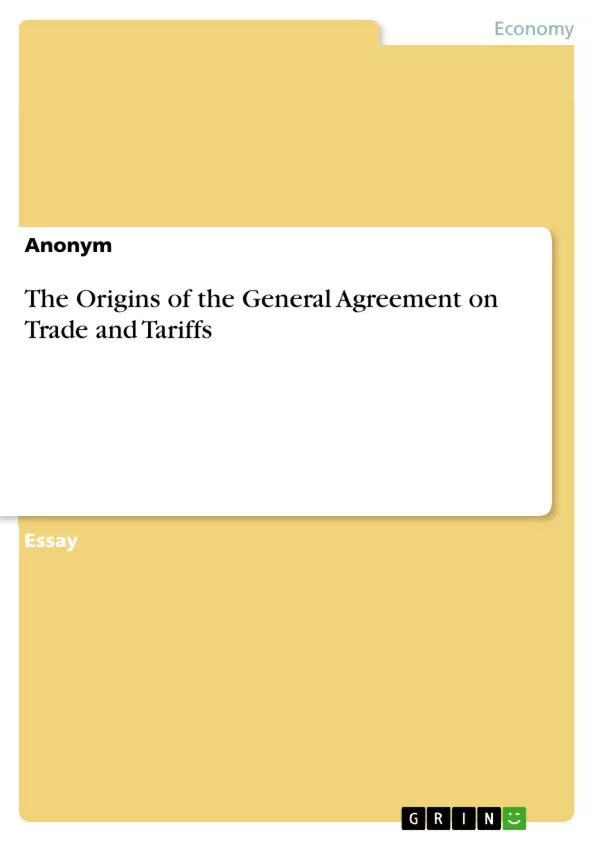For a long period of time people and countries have recognized the importance of international trade and its influence on their welfare. In general terms, as Adam Smith concluded, international trade enables the specialization of nations in the production of goods and services that they can produce more efficiently and at the same time it allows the enjoyment of products that foreign countries have comparative advantages in.
However, in specific periods, mainly due to economic ignorance and circumstances of financial uncertainty, countries have tried to protect their economic space by imposing trade restrictions. The consequence of such an action has been the deterioration of the economic environment and the persistence of severe crises. It was exactly the end of the Second World War that directed the economic philosophies of the major players in world trade towards the common idea that trade barriers should be eliminated if countries want to expand their economic potential.
As a result, their willingness to create a mutual economic environment that would produce shared financial benefits for all the members led to the creation of the General Agreement on Trade and Tariffs in 1947 in Geneva, Switzerland. The General Agreement on Trade and Tariffs was a contractual framework, a temporary agreement which priority was the reduction of trade barriers between the participating countries.
Inhaltsverzeichnis (Table of Contents)
- The Origins of the General Agreement on Trade and Tariffs
- The Great Depression and the Smoot-Hawley Act
- World Wars and Trade Restrictions
- The Bretton Woods Conference and the Creation of GATT
Zielsetzung und Themenschwerpunkte (Objectives and Key Themes)
This text aims to provide an understanding of the historical context that led to the creation of the General Agreement on Trade and Tariffs (GATT) in 1947. It examines the economic and political climate that prevailed in the aftermath of the Great Depression and World War II, highlighting the critical role of international trade in shaping global prosperity and stability.
- The impact of trade restrictions on economic growth
- The role of international organizations in regulating trade
- The historical evolution of trade policies
- The legacy of GATT in shaping the global trading system
Zusammenfassung der Kapitel (Chapter Summaries)
- The first chapter introduces the importance of international trade and examines the historical context that led to the creation of GATT, emphasizing the consequences of trade restrictions during the Great Depression and World Wars.
- The second chapter focuses on the Great Depression and its impact on global trade. It explores the role of the Smoot-Hawley Act and the detrimental effects of protectionist policies.
- The third chapter examines the role of World War I and World War II in disrupting international trade relationships and creating the need for a new framework for trade regulation.
- The fourth chapter discusses the Bretton Woods Conference and its importance in establishing the foundation for GATT, including the creation of the International Monetary Fund and the International Bank for Reconstruction and Development.
Schlüsselwörter (Keywords)
The text focuses on the historical evolution of international trade, emphasizing the role of GATT in shaping the global trading system. Key concepts include trade restrictions, tariffs, protectionism, free trade, international organizations, and the Great Depression.
What led to the creation of the GATT in 1947?
The GATT was created in response to the economic devastation of the Great Depression and World War II, with the goal of reducing trade barriers to foster global prosperity.
How did the Smoot-Hawley Act impact global trade?
The act imposed high tariffs and trade restrictions, which worsened the Great Depression and led to a collapse in international trade relationships.
What was the role of the Bretton Woods Conference?
The 1944 conference established the framework for international financial cooperation, leading to the creation of the IMF, the World Bank, and eventually the GATT.
Why did Adam Smith advocate for international trade?
Smith argued that trade allows nations to specialize in what they produce most efficiently, increasing the overall welfare of all participating countries.
Was the GATT a permanent organization?
Initially, the GATT was a temporary contractual framework and agreement, which later evolved into the permanent World Trade Organization (WTO).



